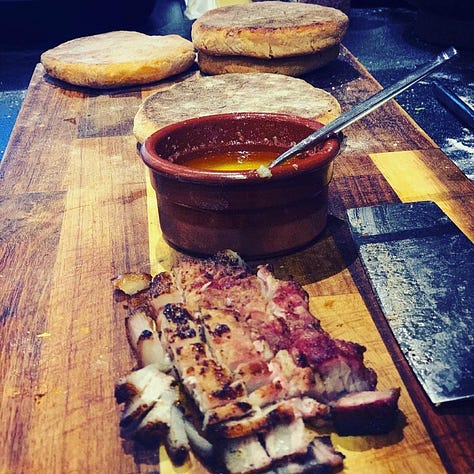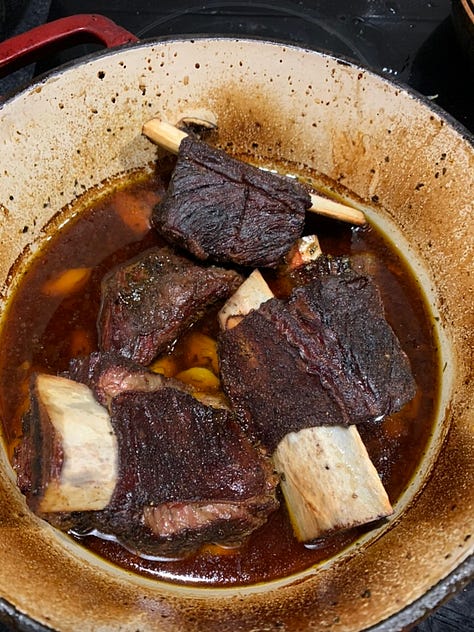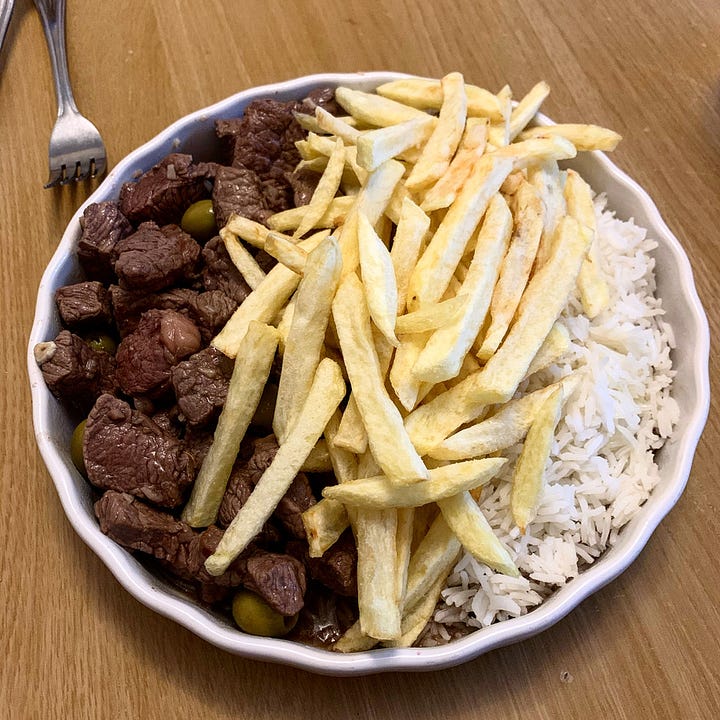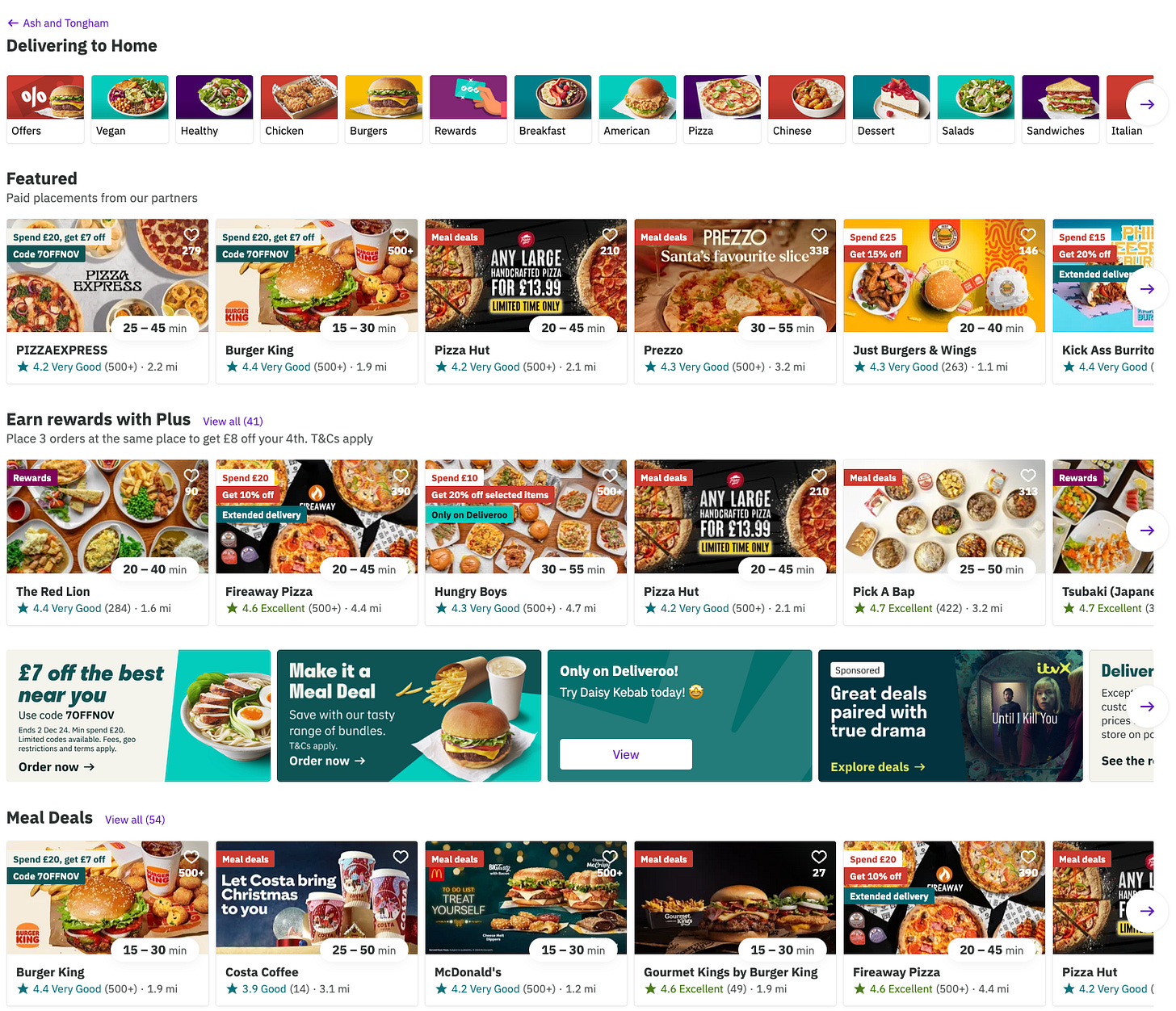The UK's Food Culture Needs a Revolution
Food should be the heartbeat of a culture. Instead, in much of the UK, it’s an afterthought...
In Portugal, where I grew up, great food is everywhere. You don’t have to search for it—it’s woven into the fabric of daily life. But here, outside of London, finding something genuinely good can feel like a treasure hunt, and too often, the prize isn’t worth the effort.
Wetherspoons and Nandos shouldn’t be a cornerstone of our food identity, but for many, it is. And that speaks volumes about how low the bar has been set.
Now before you crucify me and comment “WeLl AcTchuAlY”, hear me out…
Why is the UK Falling Behind?
When I was growing up, food was everything. In Kingsbury, London, our community revolved around BBQs at the allotments, cookouts with family, and visits to good restaurants. In Portugal, this sense of connection was even stronger—every town, no matter how small, had its culinary treasures.
But in the UK, this isn’t the norm. The UK has a reputation for bad food, and unfortunately, it’s often well-deserved. While cities like London are brimming with culinary creativity, step outside the M25, and you’re in a food desert. Chain restaurants, uninspired menus, and bland dishes dominate.
Why does this happen? Part of it is economic. Margins in the restaurant industry are razor-thin, and the cost of doing business in the UK is staggering. Small, innovative ventures struggle to survive. Meanwhile, chains with deep pockets and little creativity thrive.
The other part is cultural. In countries like Portugal or Thailand, food is sacred. It’s not just about eating; it’s about community, tradition, and pride. In the UK, convenience often wins, and mediocrity becomes the default.
The Food Desert Beyond London
Let’s address the elephant in the room: the UK has earned its reputation for bad food.
I live just outside Guildford in a town called Ash, surrounded by places like Woking, Farnham, and Farnborough. Guildford has more options than most nearby towns, but even here, it’s difficult to find food that’s genuinely exciting. Chain restaurants dominate, offering the same uninspired menus you’ll find anywhere else.
Venture further out, and the choices become even more dismal. Most of the takeaways are absolutely mid, featuring, your standard options of straight up bad kebabs, Mediocre Indian or Chinese food, and more recently cheap Japanese style bento. It’s not that there isn’t a place for these lower quality places, it’s that there needs to be something better, and it needs to cost less.
Contrast this with London. While the capital is far from perfect, its sheer variety means you can always find something exceptional. Whether it’s a Michelin-starred restaurant or a food truck serving incredible street food, London offers a glimpse of what the UK’s food culture could be. Step outside the M25, though, and it’s a different story.
Chain pubs like Wetherspoons dominate the landscape. While I respect the business model and accessibility, I struggle to see Wetherspoons as anything more than a symbol of mediocrity. People defend it by saying, “You get what you pay for,” but this argument doesn’t hold up.
In countries like Portugal or Thailand—places with far fewer resources—you can find affordable meals that are fresh, flavourful, and made with care. Why can’t we expect the same here? Why do we settle for bland, frozen meals and tired menus?
The UK Deserves Better
This doesn’t have to be our reality.
The UK has bright spots, and gastro pubs are a prime example. When done well, they’re uniquely British and absolutely brilliant. But we can’t rely on Sunday roasts and sticky toffee pudding alone.
We need a food revolution—one that makes quality food accessible everywhere, not just in major cities. Imagine a UK where food trucks were as common as pubs, where every town had its own culinary identity, and where mediocrity wasn’t tolerated.
Other countries have figured this out. In Portugal, a €10 meal at a small local restaurant can rival anything served at a Michelin-starred establishment. In Thailand, street food isn’t just affordable—it’s world-class. Why can’t the UK achieve the same?
How You Can Help Create a Food Revolution
Change starts with us.
Stop settling for bad food.
Call out mediocrity when you see it. Don’t let “you get what you pay for” be an excuse for bland, uninspired dishes, stop giving mediocre restaurants your money…
Support local businesses.
Seek out family-run restaurants, pop-ups, and food trucks. Your money makes a difference.
Push for policy change.
Advocate for government support for small food ventures, from grants to lower operating costs. This will foster innovation and help rebuild a struggling industry.
Food isn’t just about eating—it’s about culture, connection, and identity. The UK is capable of so much more. But it’s up to us to demand better.
The Cultural Problem
The UK’s food problem isn’t just economic—it’s cultural.
In Portugal, food is sacred. It’s tied to tradition, family, and pride. Every meal is an event, whether you’re dining at home or out. Even in poorer parts of the country, people take pride in the ingredients they use and the meals they serve.
The same is true in many Asian countries. In Thailand, street food is a national treasure. Vendors work tirelessly to perfect a single dish, creating flavours that rival those of high-end restaurants. These meals are affordable, accessible, and deeply ingrained in the culture.
In the UK, convenience often trumps quality. Chain restaurants thrive because they’re predictable and easy. Fast food is the default for many families. And while there’s nothing inherently wrong with convenience, it’s come at the expense of creativity and care.
Food should be a celebration, not an afterthought. Yet here, it often feels like the latter.
What the UK Gets Right
That’s not to say the UK’s food scene is all bad. There are bright spots, and gastro pubs are a prime example.
When done well, gastro pubs offer something uniquely British: hearty, comforting dishes made with local ingredients. A perfectly cooked Sunday roast, a rich sticky toffee pudding, or a creative twist on classic fish and chips can be truly outstanding.
These pubs are more than just places to eat—they’re community hubs, steeped in history and tradition. They showcase what British food can be when it’s done with care and creativity.
But the problem is scale. Outside of London and a few other cities, good food options are few and far between. Gastro pubs can’t carry the weight of an entire country’s food culture. We need more variety, more innovation, and more accessibility.
The Economic Reality
One of the biggest barriers to better food in the UK is the economy.
Running a restaurant here is incredibly difficult. Margins are razor-thin, rents are sky-high, and the cost of ingredients keeps climbing. For small businesses trying to break into the food industry, the odds are stacked against them.
This lack of support stifles creativity. Why take a risk on an innovative concept when you’re struggling just to keep the lights on? Instead, chains dominate because they have the resources to weather the storm.
In cities like London, where there’s more foot traffic and disposable income, food entrepreneurs can take risks. But in smaller towns, the economic environment simply doesn’t allow for it.
This isn’t just bad for the food scene—it’s bad for the economy. A thriving food culture creates jobs, attracts tourism, and fosters a sense of community. Investing in small food businesses could have a ripple effect, benefiting far more than just the restaurant industry.
What Needs to Change
The UK’s food culture needs a revolution, and it starts with us.
Demand Better
Stop settling for mediocrity. Call out bad food when you see it. Don’t let “you get what you pay for” be an excuse for bland, uninspired dishes.
Support Local Businesses
Seek out family-run restaurants, food trucks, and pop-ups. These are the people pushing the boundaries and creating something unique. Your support can make all the difference.
Advocate for Change
Push for policies that support small food businesses. Lower rents, grants for startups, and reduced operating costs would encourage more people to enter the industry and foster innovation.
Celebrate Food Culture
Let’s take pride in our food. Share your favourite local spots, experiment with cooking at home, and embrace the idea that food is more than just fuel—it’s culture.
A Personal Dream
For me, this critique comes from a place of love. I adore the UK and want to see it reach its full potential when it comes to food. My upbringing, surrounded by a vibrant food culture, has left me longing for that same richness here.
One day, I hope to own a restaurant—a place where people come together over incredible meals. Until then, I’ll keep cooking at home, experimenting with recipes that remind me of my roots.
But more than anything, I want to see a future where the UK’s food culture is celebrated globally. A future where every town has its own culinary identity, and good food is accessible to everyone—not just those lucky enough to live in London.





The Path Forward
The UK has the potential for an incredible food culture, but we have to fight for it. Support the innovators, challenge the status quo, and demand a higher standard.
Because food isn’t just about eating - it’s about connection, community, and culture. And we deserve better.
Let’s make the UK a place where great food is the rule, not the exception. Support your local food scene, demand better, and help create the food revolution this country needs. Most of all stop overpaying for shit food.
Do you agree? How is the food scene where you live? Let me know I’d love to hear your thoughts.





